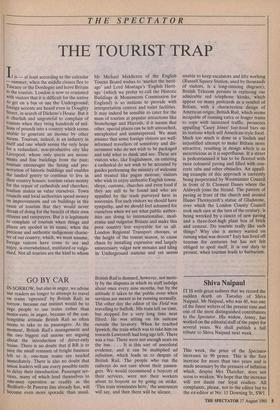THE SPECTATOR
THE TOURIST TRAP
It is — at least according to the calendar --- summer, when the middle classes flee to Tuscany or the Dordogne and leave Britain to the tourists. London is now so crammed with visitors that it is difficult for the native to get on a bus or use the Underground; foreign accents are heard even in Doughty Street, in search of Dickens's House. But it Is churlish and ungrateful to complain of tourists when they bring hundreds of mil- 'tons of pounds into a country which seems unable to generate an income by other means. Tourism, indeed, is an industry in itself and one which seems the only hope for a redundant, non-productive city like Liverpool, whose only assets are monu- Meats and fine buildings from the past; tourism encourages the listing and pre- servation of historic buildings and enables the landed gentry to continue to live in their country houses; tourism raises money for the repair of cathedrals and churches; tourism makes us value ourselves. Town Councils and local authorities spend money on improvements and on buildings in the cause of tourism that they would never dream of doing for the benefit of their own Citizens and ratepayers. But it is legitimate to complain of tourism when things and Places are spoiled in its name, when the precious and authentic indigenous charac- ter of our country, which, we must assume, foreign visitors have come to see and enjoy, is overwhelmed, mutilated or vulga- rised. Not all tourists are the kind to whom Mr Michael Middleton of the English Tourist Board wishes to 'market the herit- age' and Lord Montagu's 'English Herit- age' (which we prefer to call the Historic Buildings & Monuments Commission for England) is so anxious to provide with interpretation centres and toilet facilities. It may indeed be sensible to cater for the mass of tourists at popular attractions like Stonehenge and Harrods, if it means that other, special places can be left untouched, unexploited and uninterpreted. We must assume that some foreign visitors are well- informed travellers of sensitivity and dis- cernment who do not wish to be packaged and told what to think and see. These are visitors who, like Englishmen, on entering a cathedral do not wish to be accosted by guides performing the ministry of welcome and treated like pagan morons; visitors who wish to enjoy authentic English towns, shops, customs, churches and even food if they are still to be found and who are appalled by the trash purveyed here as souvenirs. For such visitors we should have sympathy, and we should feel ashamed for ourselves when we see what public author- ities are doing to internationalise, mod- ernise and vulgarise Britain and make this poor country less enjoyable for us all. London Regional Transport chooses, at the height of the tourist season, to cause chaos by installing expensive and largely unnecessary vulgar new mosaics and tiling in Underground stations and yet seems unable to keep escalators and lifts working (Russell Square Station, used by thousands of visitors, is a long-running disgrace); British Telecom persists in replacing our admirable red telephone kiosks, which appear on many postcards as a symbol of Britain, with a characterless design of American origin; British Rail, which seems incapable of running extra or longer trains to cope with increased traffic, promotes appalling 'Casey Jones' fast-food bars on its stations which sell American-style food. Much too much is done in a foolish and unjustified attempt to make Britain more attractive, resulting in design which is as meretricious as it is superfluous. If a street is pedestrianised it has to be floored with twee coloured paving and filled with con- crete tubs and other obstacles. An appall- ing example of this approach is currently being perpetrated by Westminster Council in front of St Clement Danes where the Aldwych joins the Strand. The pattern of paving in front of the church and around Hamo Thornycroft's statue of Gladstone, over which the London County Council took such care at the turn of the century, is being wrecked by a cancer of new paving and a three-foot-high plant box of brick and cement. Do tourists really like such things? Why else is money wasted on ruining what was decent? Italy has lived off tourism for centuries but has not felt obliged to spoil itself. It is our duty to protest, when tourism leads to barbarism.














































 Previous page
Previous page